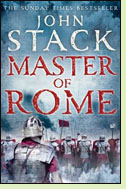Master of Rome
by John Stack
Reviewed by David Maclaine

With Master of Rome John Stack concludes his trilogy of nautical action novels covering the major events of the First Punic War. This book begins with the Romans seemingly on the brink of victory, taking the fight to the Carthaginian homeland. But readers of the first two novels will know that the Republic had an astonishing record of appointing overconfident commanders who could snatch defeat from the jaws of victory. Needless to say, the story once again offers Commander Atticus Perennis the opportunity to give sound advice to superiors who brush it aside and lead their forces into disaster, more opportunities to find enemies who resent his Greek background, and several more opportunities to save the day in spite of these obstacles. You can also track the continuing strain on his friendship with Septimus caused by his affair with the friend's sister. What will keep you going through these books is the desire to reach yet another big sea-fight, and eventually that big fight does arrive.
It's easy to think of ways the Masters of the Sea series could have been better. Stack is a well-meaning guy who has done better than the average Joe who turns his hand to fiction after a career that did not hinge on writing skill. He has beaten the odds and gotten published. No one else has managed to turn the crucial first war between Rome and Carthage into fiction, and readers who prefer to get their history in novel form, instead of trying to track down a copy of Polybius, will be grateful. It's a slice of history worth knowing, and Master of Rome provides a satisfactory, though not exactly masterful, conclusion to his series. I'm happier to have finished it than I was to be still pulling away at my oar midway through the story, fighting through the chop of his sentences. But like the Roman Republic whose struggle he describes, Stack overcomes embarrassing blunders to reach a more or less successful conclusion. (2011, 384 pages)
More about Master of Rome at Powell's Books, Amazon.comCaptain of Rome appears on the list of The 50 Best Historical Novels for a Survey of Ancient Roman History
Other novels involving ancient naval combat:
Ship of Rome by John Stack (2009), #1 in the Masters of the Sea series. See review or more info at Powell's Books
Captain of Rome by John Stack (2010), #2 in the Masters of the Sea series. See review or more info at Powell's Books
The October Horse by Colleen McCullough (2002), about Julius Caesar's intervention in the civil war between Cleopatra and her brother. More info
Nonfiction about the First Punic War:
The First Punic War by J.F. Lazenby (1996). More info
The Punic Wars by Adrian Goldsworthy (2001). More info
Carthage Must Be Destroyed: The Rise and Fall of an Ancient Civilization by Richard Miles (2011). More info
Online:
First Punic War by the ancient Greek historian Polybius, at www.Livius.org
Back to Novels of Ancient History
Back to Directory of Book Reviews